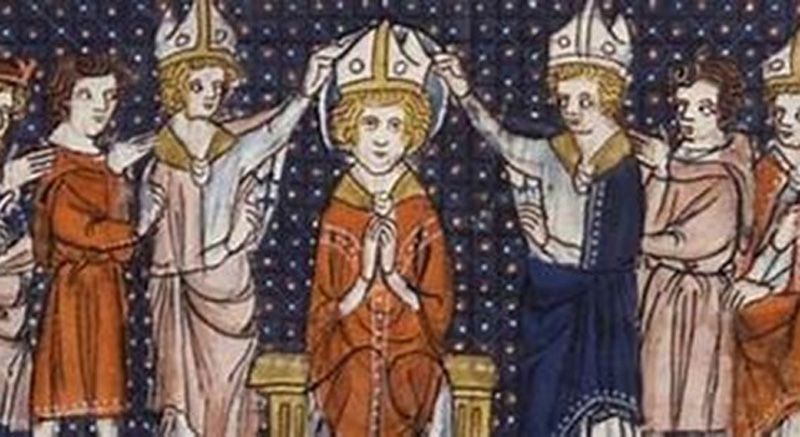(315-368)
St. Hilary was born in Poitiers, a town in southwest France, in 315, into an upper-class, non-Christian family.
He was raised as a pagan, given a solid liberal education, and was fluent in both Latin and Greek. He was married as a young man, and had a daughter named Apra.
In 350, inspired by his study of the Bible, he was baptized. Only three years later, over his objections, Hilary was elected bishop of Poitiers, while still a married layman.
He was a staunch defender of the Trinitarian doctrine of the Council of Nicaea (325) that declared that Jesus is divine, eternal and consubstantial, of the same substance, as the Father. Furthermore, he strenuously opposed Arianism which held that Jesus is the greatest of human beings but less than God, created and not eternal.
The synod of Beziers in 356, comprised mainly of Arian bishops, condemned Hilary for his orthodox beliefs. Subsequently, the Emperor Constantius exiled Hilary to Phrygia, a region in Asia Minor.
Upon his arrival in the East, Hilary was invited to attend the Council of Seleucia in 359, where he remained insistent about the divinity of Jesus. He was deeply disappointed that so many resisted him and clung to their erroneous ideas, and that so many bishops who supposedly were his allies remained silent and in effect yielded to the opposition.
The Arians detested his presence, regarded him as “the sower of discord and the troublemaker of the Orient,” and petitioned the emperor to end his exile and allow him to return to Poitiers, and they were overjoyed when he departed in 360.
Warmly received upon his return, Hilary convoked a synod of Gallic bishops in Paris in 361 to unify and solidify their support of Nicaea. He exerted his leadership, not only in France, but throughout Europe, and he traveled extensively, constantly a vigorous proponent of the Nicene Trinitarian doctrine. In 364 he publicly denounced Auxentius, the Arian bishop of Milan. He also objected to the emperor’s interference in the church and insisted on separation between the church and government.
Hilary died at of 53 of exhaustion, worn out from his travels, his exile to the East, and the relentless bitter wrangling. St. Augustine called him “the illustrious doctor of the churches,” and in 1851 Pope Pius IX declared Hilary a Doctor of the Church.
Adapted by A.J. Valentini from: Sloun, F. M. (2019, Jan. 12). St. Hilary, Bishop and Doctor of the Church. Catholic Hotdish. http://catholichotdish.com/the-pastors-page/st-hilary-bishop-and-doctor-of-the-church/
